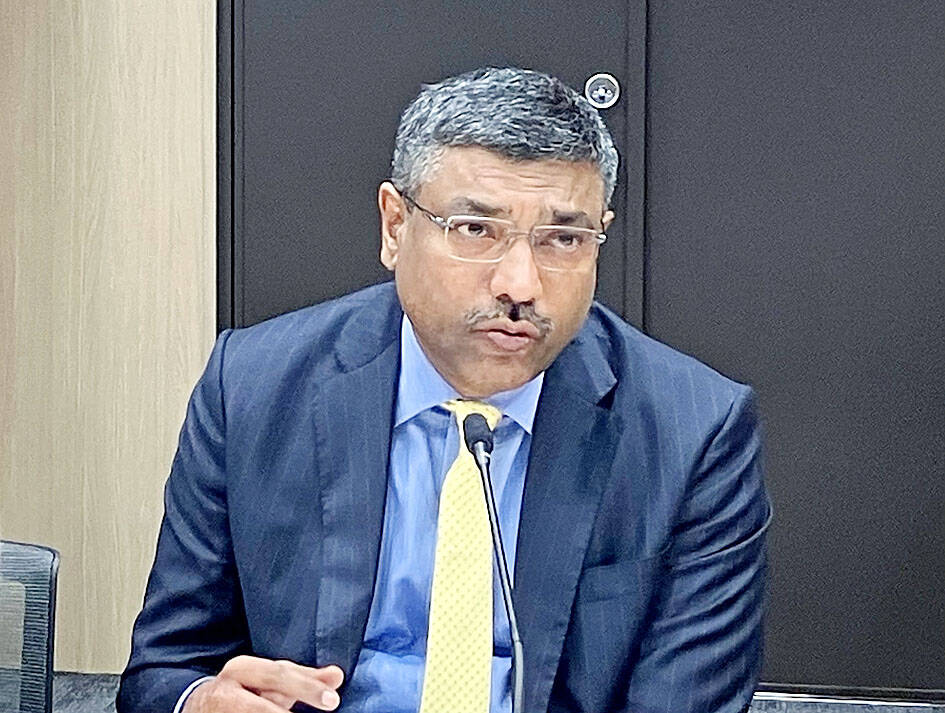Two Indian officials are visiting Taiwan to attend Semicon Taiwan trade show and meet with local industry leaders to enhance collaboration between India and Taiwan in the global semiconductor ecosystem.
“Taiwan has built a place for itself in this entire value chain. So clearly, there is something that Taiwan has done right over the years,” S. Krishnan, secretary of Indian Ministry of Electronics and Information Technology, said at a press event in Taipei.
Over the past decades, Taiwanese companies such as Hon Hai Precision Industry Co (鴻海精密), also known internationally as Foxconn Technology Group (富士康科技集團), Pegatron Corp (和碩) and Delta Electronics Inc (台達電) have been successful in India, particularly in the electronics sector, he noted.

Photo courtesy of the India Taipei Association via CNA
Last year, India’s Tata Electronics Pvt Ltd partnered with Taiwan’s Powerchip Semiconductor Manufacturing Corp (力積電) to establish India’s first 12-inch wafer fabrication plant, in Dholera, Gujarat, Krishnan said.
Such cooperation between India and Taiwan indicates that India is “favorable ground” for the high tech industry, as it is “a big market, a source of human resources, and a source of a youthful population with talent,” he said.
The other Indian official visiting Taiwan this week is Amitesh Sinha, CEO of India Semiconductor Mission, the government agency responsible for formulating and implementing strategic initiatives in the field of semiconductors.
The two Indian officials are aiming to explore new synergies in areas such as advanced semiconductor design and manufacturing, capital equipment, and supply chain resilience, according to the India Taipei Association, which represents India’s interests in Taiwan in the absence of diplomatic ties.
Asked about his impressions so far, Krishnan said he has learned that Taiwan hosts a number of niche technologies in the semiconductor sector, which provide different kinds of services.
“We [in India] need to look at the entire ecosystem in order to support a number of linked companies,” he said.
The secretary also said he was impressed with how Taiwan’s “academic institutions are aligned with what is being done for the semiconductor sector.”
“So, we have to aim for a much closer alignment between our leading academic institutions and what is happening in the semiconductor space,” he added.
Semicon Taiwan is an annual trade exhibition and conference for semiconductor, semiconductor device fabrication, microelectronics manufacturing, packaging, and test technologies.
The three-day event, which concludes today, features more than 1,200 semiconductor and technology companies, with over 4,100 booths, and it is expected to draw an estimated 100,000 industry professionals, according to the organizers.

In Italy’s storied gold-making hubs, jewelers are reworking their designs to trim gold content as they race to blunt the effect of record prices and appeal to shoppers watching their budgets. Gold prices hit a record high on Thursday, surging near US$5,600 an ounce, more than double a year ago as geopolitical concerns and jitters over trade pushed investors toward the safe-haven asset. The rally is putting undue pressure on small artisans as they face mounting demands from customers, including international brands, to produce cheaper items, from signature pieces to wedding rings, according to interviews with four independent jewelers in Italy’s main

Japanese Prime Minister Sanae Takaichi has talked up the benefits of a weaker yen in a campaign speech, adopting a tone at odds with her finance ministry, which has refused to rule out any options to counter excessive foreign exchange volatility. Takaichi later softened her stance, saying she did not have a preference for the yen’s direction. “People say the weak yen is bad right now, but for export industries, it’s a major opportunity,” Takaichi said on Saturday at a rally for Liberal Democratic Party candidate Daishiro Yamagiwa in Kanagawa Prefecture ahead of a snap election on Sunday. “Whether it’s selling food or

CONCERNS: Tech companies investing in AI businesses that purchase their products have raised questions among investors that they are artificially propping up demand Nvidia Corp chief executive officer Jensen Huang (黃仁勳) on Saturday said that the company would be participating in OpenAI’s latest funding round, describing it as potentially “the largest investment we’ve ever made.” “We will invest a great deal of money,” Huang told reporters while visiting Taipei. “I believe in OpenAI. The work that they do is incredible. They’re one of the most consequential companies of our time.” Huang did not say exactly how much Nvidia might contribute, but described the investment as “huge.” “Let Sam announce how much he’s going to raise — it’s for him to decide,” Huang said, referring to OpenAI

The global server market is expected to grow 12.8 percent annually this year, with artificial intelligence (AI) servers projected to account for 16.5 percent, driven by continued investment in AI infrastructure by major cloud service providers (CSPs), market researcher TrendForce Corp (集邦科技) said yesterday. Global AI server shipments this year are expected to increase 28 percent year-on-year to more than 2.7 million units, driven by sustained demand from CSPs and government sovereign cloud projects, TrendForce analyst Frank Kung (龔明德) told the Taipei Times. Demand for GPU-based AI servers, including Nvidia Corp’s GB and Vera Rubin rack systems, is expected to remain high,